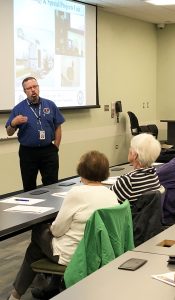DuPage County Homeland Security experts talk safety with seniors
By Cathy Janek for Chronicle Media — July 5, 2018
John Nebl, coordinator with the DuPage County Office of Homeland Security and Emergency Management, speaks at a recent crime prevention workshop hosted by the College of DuPage in Glen Ellyn. (Photo by Cathy Janek / for Chronicle Media).
Nada Kondich of Lombard aimed a Nerf gun at a moving bullseye on a large screen while other members of the audience threw balls at her as part of a recent crime prevention workshop hosted by College of DuPage.
The exercise illustrated ways to counter an attacker — an option that could be used as last resort, according to Julie Smith, a crime prevention specialist with the Naperville Police Department.
A recent retiree, Kondich said she comes to events like this to learn “anything I could do to (better) prepare. Everything is different now.”
Smith asked if they remember conducting tornado drills and fire drills, but “how many of us did critical incident or shooter drills.”
The counter measure is part of ALICE training which stands for alert, lockdown, inform, counter, evacuate.
“(It’s) a new way to respond to a critical incident,” Smith told the audience comprised primarily of retirees who attended the program held at the Homeland Security Training Institute at College of DuPage.
Smith said, countering can include creating noise, movement, distance and distraction with the intent of reducing the shooter’s ability to aim accurately.
“Action beats reaction, you are not a sitting duck,” she said.
“We have learned through other tragedies that the longer we wait to do something, the more people die,” she said. “A proactive plan increases your chances for survival.”
There are shootings almost every other day, Smith said.
“A shooter can be in a movie theatre, a parking lot, or school. It is something we all need to be conscious about and learn how to react if we are ever in that situation—it is mental mindset and situational awareness,” she said. “We have learned that time is of the essence. Many incidents last under two minutes.”
ALICE training provides information on how to respond to an active shooter.
Smith said that in these types of situations people have one of three reactions—flight, fight, or freeze.
ALICE training which Smith has conducted in Naperville churches and schools should increase the odds of survival.
Tom Brady, the Associate Dean of the Homeland Security Training Institute, said the college began offering these workshops a couple of years ago.
“With everything going on in our world today from school shootings to domestic terrorism, there are a lot things we have to think about that we didn’t have to think about 20 or 30 years ago. It is a different world we live in,” he said.
John Nebl, a coordinator with the DuPage County Office of the Homeland Security and Emergency Management, also spoke about its Event Readiness program.
“We act as a support assist agency to local municipalities,” he added
The program was developed due to DuPage County’s size (it ranks as the second most populous county in the state with almost one million residents) but also because it hosts many large-scale events each year including Naperville’s Ribfest, Lisle’s Eyes to the Skies Festival and Itasca’s Fourth of July Fireworks–the largest fireworks in the Chicago area.
Nebl said, “We have seen people with ill intent target large public gatherings,” but in other situations tragedies arose due to weather-related issues such as the stage collapse during the Indiana State Fair in 2011.
“We look at the whole scope of an event,” he added. “We can’t stop everything. But it is key if we reduce the potential impact.”
Nebl also stressed how individuals can take steps to ensure they are better prepared for an emergency.
Prepare a kit of emergency supplies that includes food for three days, water, flashlights, first aid kit and important family documents.
The next three steps include making an emergency plan, stay informed, and get involved, he added.
“Don’t forget your pets,” Nebl said.
Formerly a resident of DuPage County, Dennis Luehring who relocated to Batavia said he has been coming to the crime prevention workshops since they began.
“I am trying to get ahead of the game and learn as much as I can,” he added.
A grandfather of two young school age children, Luehring said he hopes changes will be made to local schools to prevent weapons from entering the building.
“It is not like when I grew up. Nothing is the same anymore,” he added.
—– DuPage County Homeland Security experts talk safety with seniors —-



